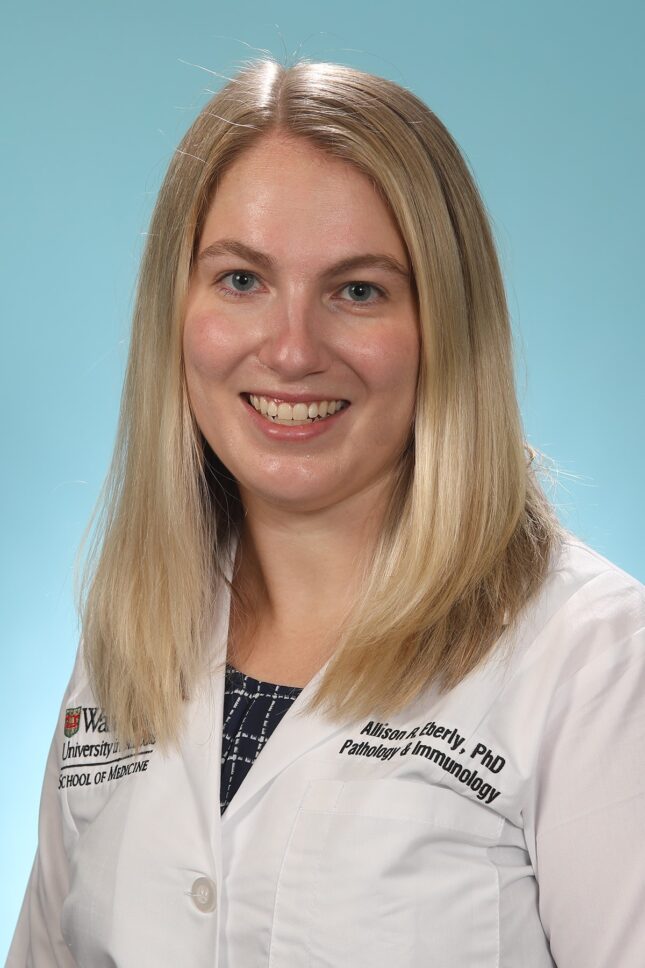For this Faculty Feature, we spoke with Allison Eberly, PhD. Dr. Eberly’s interests include microbiology, molecular diagnostics of infectious diseases, mycobacteriology, nontuberculosis mycobacteria (NTM) infections, sexually transmitted infections (STIs), and optimizing test utilization.
Tell us about your background. Where did you grow up, and when did you first become interested in science and medicine?
I was born and raised in Pennsylvania Dutch Country, where I spent a lot of time outdoors around animals, gardening, and cooking and baking with my grandparents (not quite on an Amish farm, but they were just down the lane!).
Sounds silly now, but I wanted to cure my great-grandmother’s cancer when I was approximately 5 years old. I pretended that blowing bubbles could cure her. While that was naïve thinking, my curiosity for science, medicine, and research remained throughout my school-age years.
What is your career path?
I studied chemistry and molecular biology in undergraduate at Chestnut Hill College (and was a division 2 college athlete for volleyball and cross country…) My summer research after my freshman year through a National Science Foundation Research Experience for Undergraduates (REU) program at Boise State University solidified that graduate school was the next likely step for me.
I entered the interdisciplinary graduate program (IGP) at Vanderbilt University, where there were approximately 14 different tracks allowing me to rotate in 4 different labs. I knew I wanted to train in Dr. Maria Hadjifrangiskou’s lab because of her mentorship (and belief that there were more careers than running an academic research lab) and the research around biofilm formation and signal transduction of uropathogenic E. coli. It was about 2.5 years in, right after my qualifying exam, that I realized the basic research aspect was not fulfilling to me and that I wanted to do something more clinical. Rather than being offended that I did not love signal transduction like Dr. Hadjifrangiskou did, she introduced me to clinical lab science, and we started collaborating with the clinical microbiologists on what became one of my main thesis projects of characterizing clinical isolates and their ability to form biofilms.
I knew that a Clinical Microbiology Fellowship program was next after observing the day-to-day of the clinical microbiology lab and lab directors at Vanderbilt. I trained in Clinical Microbiology at Mayo Clinic in Rochester, MN from 2019-2021. What a place to train during a global pandemic!
After fellowship, I began my current role at WUSM as an assistant professor and associate medical director in the Microbiology and Molecular Infectious Diseases Laboratories.
What are your favorite parts of your current role?
I enjoy rounding in both the micro and molecular labs- interacting with lab techs and trainees to assist with tough clinical cases. I especially enjoy my role as the community lab liaison for microbiology testing. The resources are very different between an academic hospital lab and community-based labs. Rather than being viewed as “us vs them”, I strive to work in the “we” – collaboratively with the community hospital labs. We are one system and patients deserve the same high standard of care and lab testing across all sites.
What is a memorable moment you’ve had while working in the department?
Taking lessons learned from the pandemic, I worked with Dr. Neil Anderson and the Molecular Infectious Disease laboratory to formulate a plan to implement rapid and batched testing for STI tests (chlamydia, gonorrhea, and trichomonas). Implementing a BJC system-wide procedure such that outpatients are batch tested once a day and ED and inpatients are resulted within 4 hours of receipt, allowed us to endure a subsequent supply chain shortage by having redundancy in our testing!
What special skills or talents do you have that people may not know about?
My Pennsylvania Dutch heritage shines through in my ability to can veggies, fruit, etc., though unfortunately, I haven’t mastered the growing of the veggies and fruit yet!
What are some of your favorite hobbies or activities?
Spending quality time with family and friends, especially my husband and 2 dogs! Although I miss coaching volleyball, I enjoy playing recreationally both indoor and outdoor (sand) leagues.
What is your advice to aspiring people in your field?
Clinical microbiology is a small (but mighty!) community. Meet as many people as you can- listen and learn about their experiences. Don’t be afraid to ask your colleagues – internal and external – for advice, you are never alone!
